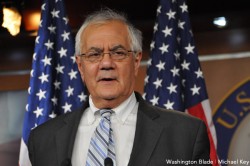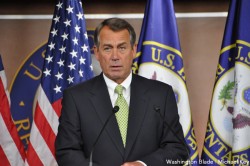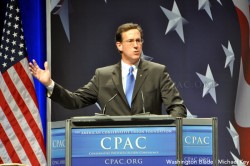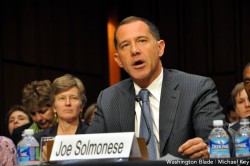National
2011: A year of milestones, tragedies, courtroom fights
From N.Y. marriage to Frank’s retirement, another year to remember in LGBT news

The story of the year was the end of “Don’t Ask, Don’t Tell.” Here are our picks for the rest of 2011’s top LGBT news stories.
#2 N.Y. approves marriage
The Empire State became the sixth and most populous state in the country to legalize same-sex marriage in June when the legislature passed and Gov. Andrew Cuomo (D) signed into law a bill legalizing marriage rights for gay couples.
Upon passage of the legislation, Cuomo said New York has “finally torn down the barrier that has prevented same-sex couples from exercising the freedom to marry and from receiving the fundamental protections that so many couples and families take for granted.”
The achievement marks the first time that a Republican-controlled legislative chamber — in this case, the New York State Senate — passed legislation in this country legalizing same-sex marriage.
The law went into effect in the state on July 24. Kitty Lambert and Cheryle Rudd, a lesbian couple from Buffalo, N.Y., wed in Niagara Falls at midnight and became the first couple in the state to benefit from the law.
#3 Rep. Barney Frank retires

Rep. Barney Frank announced in November that he wouldn’t seek a 17th term in the House. (Blade photo by Michael Key)
The longest-serving openly gay member of Congress announced in November that he wouldn’t seek a 17th term in the U.S. House.
Rep. Barney Frank (D-Mass.), 71, was first elected to Congress in 1980. The lawmaker made his sexual orientation known in 1987 — becoming the second to do so after Rep. Gerry Studds (D-Mass.).
Frank said redistricting in Massachusetts and his desire to retire before reaching age 75 prompted his decision not to run.
“I have enjoyed — indeed been enormously honored — by the chance to represent others in Congress and the State Legislature, but there are other things I hope to do before my career ends,” Frank said.
The lawmaker is credited with helping shepherd through the passage of hate crimes protections legislation and “Don’t Ask, Don’t Tell” repeal in the 111th Congress. But Frank was criticized by transgender activists in 2007 for dropping gender identity protections from the Employment Non-Discrimination Act. The gay-only bill ultimately died in the Senate.
His most enduring legacy will likely be the passage of Wall Street reform legislation commonly known as Dodd-Frank, which he pushed through as chair of the House Financial Services Committee.
#4 Obama won’t defend DOMA; Boehner hires counsel

House Speaker John Boehner announced that he would hire counsel to defend DOMA in court after the Obama administration said it would no longer do so. (Washington Blade file photo by Michael Key)
The Obama administration made a significant reversal in policy in February when it announced it would no longer defend the Defense of Marriage Act in court.
In a Feb. 22 letter, the U.S. Attorney General Eric Holder notified Congress that laws related to sexual orientation, such as DOMA, which prohibits federal recognition of same-sex marriage, should be subjected to heightened scrutiny.
“The president has also concluded that Section 3 of DOMA, as applied to legally married same-sex couples, fails to meet that standard and is therefore unconstitutional,” Holder said.
Obama’s decision riled House Speaker John Boehner (R-Ohio), who accused the president of abandoning his constitutional duties. In March, Boehner convened the Bipartisan Legal Advisory Group, which on a 3-2 party-line basis voted to defend the law in court in the administration’s stead.
To assist the House general counsel in defending the law, Boehner hired private attorney Paul Clement, a U.S. solicitor general under former President George W. Bush. The cost of the private attorney was initially announced at a blended rate of $520 an hour and total cost cap of $150,000, but Boehner later bumped up the cost cap to $1.5 million.
#5 Giffords shot; gay intern hailed as hero

Gay intern Daniel Hernandez was credited with helping to save the life of Rep. Gabrielle Giffords after she was shot. (Blade photo by Michael Key)
The nation recoiled in horror in January after pro-LGBT Rep. Gabrielle Giffords (D-Ariz.) became one of 20 people shot people by a gunman during a town hall event in her district.
Daniel Hernandez Jr., a gay 20-year-old who had worked as an intern for Giffords for just five days at the time of the shooting, was credited with providing the first aid that saved her life.
“The attitude that I had,” Hernandez said, “was trying to make sure that those who had been injured were going to be OK, so to try to provide whatever first aid I could until someone else could come in and take over.”
Medics arrived on the scene to take Giffords and others to the University Medical Center in Arizona. Giffords slowly recovered and made her first appearance on the House floor in August to vote in favor of the agreement to raise the debt ceiling limit.
At a memorial service, President Obama called Hernandez a “hero” during his eulogy. The White House invited Hernandez — along with his father, Danny Hernandez Sr., — to sit alongside first lady Michelle Obama during the State of the Union address in January.
#6. Clinton, Obama endorse int’l LGBT rights

Hillary Clinton delivered a sweeping pro-LGBT speech in December calling for other nations to respect gay rights as human rights. (Washington Blade file photo by Michael Key)
Secretary of State Hillary Clinton in December gave a high-profile speech in Geneva, Switzerland in which she spoke out against human rights abuses committed against LGBT people overseas.
During the speech, Clinton reiterated her previously held belief that human rights are gay rights and gay rights are human rights and said LGBT people overseas “have an ally in the United States of America.”
“It is a violation of human rights when people are beaten or killed because of their sexual orientation, or because they do not conform to cultural norms about how men and women should look or behave,” Clinton said.
Clinton gave the speech on Dec. 6 in observance of Human Rights Day, which recognizes the adoption of the Universal Declaration of Human Rights on Dec. 10, 1948 by the U.N. General Assembly. More than 1,000 diplomats and experts were in attendance.
On the same day, President Obama issued a memorandum to government agencies urging them to step up efforts against anti-LGBT human rights abuses abroad. Among other things, the memo calls on agencies to work against the criminalization of homosexual acts overseas and directs the State Department to lead a “standing group” to respond swiftly to serious incidents threatening LGBT human rights abroad.
#7 Jamey Rodemeyer commits suicide
A 14-year-old from Williamsville, N.Y. took his own life in September after his parents said he was subjected to bullying in school over his sexual orientation.
Jamey Rodemeyer, who attended Williamsville North High School, took his life in an apparent hanging. Prior to his death, he sent his last message in the form of a tweet to Lady Gaga, which read, “Bye Mother Monster. Thank you for all you have done. Paws up forever.”
Rodemeyer made a video for the “It Gets Better” project, a website dedicated to preventing teen suicide, in which he identified as bisexual and described the harassment he endured from other students.
“I just want to tell you that it does get better [be]cause when I came out for being bi I got so much support from my friends and it made me feel so secure,” Rodemeyer says in the video.
Rodemeyer’s death inspired outrage across the nation. Lady Gaga told her fans via Twitter she spent the days after his suicide “reflecting, crying and yelling.” She later met with President Obama over the issue of bullying.
#8 GOP hopefuls tout anti-gay views

Former Sen. Rick Santorum said he would resinstate ‘Don’t Ask, Don’t Tell’ if elected president. (Blade photo by Michael Key)
Presidential election season officially kicked off this year as Republican candidates seeking to oust President Obama from the White House touted their anti-gay views.
Former U.S. Sen. Rick Santorum likely took the prize for emphasizing anti-gay positions most often in his campaign. In addition to pledging to reinstate “Don’t Ask, Don’t Tell,” Santorum said, “our country will fail” as a result of same-sex marriage. He also raised eyebrows in August when he said same-sex marriage is like “saying this glass of water is a glass of beer.”
Activists with Truth Wins Out revealed the therapy clinic that Rep. Michele Bachmann (R-Minn.) co-owns with her husband, Marcus Bachmann, engages in widely discredited “ex-gay” conversion therapy aimed at turning gay people straight. The candidate has refused to answer questions about the clinic.
A total of five contenders — former Massachusetts Gov. Mitt Romney, former House Speaker Newt Gingrich, Santorum, Texas Gov. Rick Perry and Bachmann — each penned their name to an anti-gay pledge from the National Organization for Marriage. Signing the document commits them to backing a U.S. constitutional amendment against same-sex marriage and to defending the Defense of Marriage of Act in court.
#9 Prop 8 fight continues in California
Litigation seeking to overturn Proposition 8 progressed through the courts this year amid questions over whether proponents have standing to defend the law and whether the sexual orientation of the judge who ruled against the marriage ban should have disqualified him.
In the case of Perry v. Brown, the U.S. Ninth Circuit Court of Appeals in January sent the question of whether Prop 8 proponents had standing to defend the amendment in court to the California Supreme Court. The question emerged after state officials declined to litigate on behalf of the same-sex marriage ban.
In November, the California high court issued a unanimous decision that Protect Marriage and other groups who worked to pass the anti-gay initiative in 2008 indeed could continue the case.
Another challenge to U.S. District Judge Vaughn Walker’s decision emerged in April after the retired magistrate told reporters he’s gay and has been living with a same-sex partner for 10 years. Proponents of Prop 8 said Walker should have recused himself from the case.
But in June, U.S. District Judge James Ware ruled that Walker’s sexual orientation wasn’t a factor in the judge’s decision to rule against Prop 8 and upheld the previous decision. The anti-gay activists appealed the ruling to the Ninth Circuit.
The Ninth Circuit heard oral arguments on whether Walker’s sexual orientation should have disqualified him as well as whether the tapes of the trial should be made public. The appellate court has yet to make a decision on any of these issues.
#10 Solmonese steps down from HRC

HRC President Joe Solmonese announced in August that he would step down after six years at the helm of the nation’s leading LGBT advocacy group. (Washington Blade file photo by Michael Key)
The head of the Human Rights Campaign announced in August that after six years he would be stepping down as president of the nation’s largest LGBT organization.
The co-chairs of the board of directors of HRC and its sister organization, the HRC Foundation, said Joe Solmonese will remain as head of both organizations until the completion of his contract in March to ensure a smooth leadership transition.
Solmonese oversaw the defeat of the Federal Marriage Amendment in 2006 as well as passage of hate crimes protections legislation and repeal of “Don’t Ask, Don’t Tell.” But he alienated many transgender activists in 2007 when he declined to oppose a decision by House Democratic leaders to remove protections for transgender people from the Employment Non-Discrimination Act.
The search committee seeking Solmonese’s replacement is being co-chaired by board members Joni Madison of North Carolina and Dana Perlman of Los Angeles. The replacement has yet to be announced.
The White House
Four states to ignore new Title IX rules protecting transgender students
Biden administration last Friday released final regulations

BY ERIN REED | Last Friday, the Biden administration released its final Title IX rules, which include protections for LGBTQ students by clarifying that Title IX forbids discrimination based on sexual orientation and gender identity.
The rule change could have a significant impact as it would supersede bathroom bans and other discriminatory policies that have become increasingly common in Republican states within the U.S.
As of Thursday morning, however, officials in at least four states — Oklahoma, Louisiana, Florida, and South Carolina — have directed schools to ignore the regulations, potentially setting up a federal showdown that may ultimately end up in a protracted court battle in the lead-up to the 2024 elections.
Louisiana State Superintendent of Education Cade Brumley was the first to respond, decrying the fact that the new Title IX regulations could block teachers and other students from exercising what has been dubbed by some a “right to bully” transgender students by using their old names and pronouns intentionally.
Asserting that Title IX law does not protect trans and queer students, Brumley states that schools “should not alter policies or procedures at this time.” Critically, several courts have ruled that trans and queer students are protected by Title IX, including the 4th U.S. Circuit Court of Appeals in a recent case in West Virginia.
In South Carolina, Schools Supt. Ellen Weaver wrote in a letter that providing protections for trans and LGBTQ students under Title IX “would rescind 50 years of progress and equality of opportunity by putting girls and women at a disadvantage in the educational arena,” apparently leaving trans kids out of her definition of those who deserve progress and equality of opportunity.
She then directed schools to ignore the new directive while waiting for court challenges. While South Carolina does not have a bathroom ban or statewide “Don’t Say Gay or Trans” law, such bills continue to be proposed in the state.
Responding to the South Carolina letter, Chase Glenn of Alliance For Full Acceptance stated, “While Supt. Weaver may not personally support the rights of LGBTQ+ students, she has the responsibility as the top school leader in our state to ensure that all students have equal rights and protections, and a safe place to learn and be themselves. The flagrant disregard shown for the Title IX rule tells me that our superintendent unfortunately does not have the best interests of all students in mind.”
Florida Education Commissioner Manny Diaz also joined in instructing schools not to implement Title IX regulations. In a letter issued to area schools, Diaz stated that the new Title IX regulations were tantamount to “gaslighting the country into believing that biological sex no longer has any meaning.”
Governor Ron DeSantis approved of the letter and stated that Florida “will not comply.” Florida has notably been the site of some of the most viciously anti-queer and anti-trans legislation in recent history, including a “Don’t Say Gay or Trans” law that was used to force a trans female teacher to go by “Mr.”
State Education Supt. Ryan Walters of Oklahoma was the latest to echo similar sentiments. Walters has recently appointed the right-wing media figure Chaya Raichik of Libs of TikTok to an advisory role “to improve school safety,” and notably, Raichik has posed proudly with papers accusing her of instigating bomb threats with her incendiary posts about LGBTQ people in classrooms.
The Title IX policies have been universally applauded by large LGBTQ rights organizations in the U.S. Lambda Legal, a key figure in fighting anti-LGBTQ legislation nationwide, said that the regulations “clearly cover LGBTQ+ students, as well as survivors and pregnant and parenting students across race and gender identity.” The Human Rights Campaign also praised the rule, stating, “rule will be life-changing for so many LGBTQ+ youth and help ensure LGBTQ+ students can receive the same educational experience as their peers: Going to dances, safely using the restroom, and writing stories that tell the truth about their own lives.”
The rule is slated to go into effect Aug. 1, pending any legal challenges.
****************************************************************************

Erin Reed is a transgender woman (she/her pronouns) and researcher who tracks anti-LGBTQ+ legislation around the world and helps people become better advocates for their queer family, friends, colleagues, and community. Reed also is a social media consultant and public speaker.
******************************************************************************************
The preceding article was first published at Erin In The Morning and is republished with permission.
Pennsylvania
Malcolm Kenyatta could become the first LGBTQ statewide elected official in Pa.
State lawmaker a prominent Biden-Harris 2024 reelection campaign surrogate

Following his win in the Democratic primary contest on Wednesday, Pennsylvania state Rep. Malcolm Kenyatta, who is running for auditor general, is positioned to potentially become the first openly LGBTQ elected official serving the commonwealth.
In a statement celebrating his victory, LGBTQ+ Victory Fund President Annise Parker said, “Pennsylvanians trust Malcolm Kenyatta to be their watchdog as auditor general because that’s exactly what he’s been as a legislator.”
“LGBTQ+ Victory Fund is all in for Malcolm, because we know he has the experience to win this race and carry on his fight for students, seniors and workers as Pennsylvania’s auditor general,” she said.
Parker added, “LGBTQ+ Americans are severely underrepresented in public office and the numbers are even worse for Black LGBTQ+ representation. I look forward to doing everything I can to mobilize LGBTQ+ Pennsylvanians and our allies to get out and vote for Malcolm this November so we can make history.”
In April 2023, Kenyatta was appointed by the White House to serve as director of the Presidential Advisory Commission on Advancing Educational Equity, Excellence and Economic Opportunity for Black Americans.
He has been an active surrogate in the Biden-Harris 2024 reelection campaign.
The White House
White House debuts action plan targeting pollutants in drinking water
Same-sex couples face higher risk from environmental hazards

Headlining an Earth Day event in Northern Virginia’s Prince William Forest on Monday, President Joe Biden announced the disbursement of $7 billion in new grants for solar projects and warned of his Republican opponent’s plans to roll back the progress his administration has made toward addressing the harms of climate change.
The administration has led more than 500 programs geared toward communities most impacted by health and safety hazards like pollution and extreme weather events.
In a statement to the Washington Blade on Wednesday, Brenda Mallory, chair of the White House Council on Environmental Quality, said, “President Biden is leading the most ambitious climate, conservation, and environmental justice agenda in history — and that means working toward a future where all people can breathe clean air, drink clean water, and live in a healthy community.”
“This Earth Week, the Biden-Harris Administration announced $7 billion in solar energy projects for over 900,000 households in disadvantaged communities while creating hundreds of thousands of clean energy jobs, which are being made more accessible by the American Climate Corps,” she said. “President Biden is delivering on his promise to help protect all communities from the impacts of climate change — including the LGBTQI+ community — and that we leave no community behind as we build an equitable and inclusive clean energy economy for all.”
Recent milestones in the administration’s climate policies include the U.S. Environmental Protection Agency’s issuance on April 10 of legally enforceable standard for detecting and treating drinking water contaminated with polyfluoroalkyl substances.
“This rule sets health safeguards and will require public water systems to monitor and reduce the levels of PFAS in our nation’s drinking water, and notify the public of any exceedances of those levels,” according to a White House fact sheet. “The rule sets drinking water limits for five individual PFAS, including the most frequently found PFOA and PFOS.”
The move is expected to protect 100 million Americans from exposure to the “forever chemicals,” which have been linked to severe health problems including cancers, liver and heart damage, and developmental impacts in children.
An interactive dashboard from the United States Geological Survey shows the concentrations of polyfluoroalkyl substances in tapwater are highest in urban areas with dense populations, including cities like New York and Los Angeles.
During Biden’s tenure, the federal government has launched more than 500 programs that are geared toward investing in the communities most impacted by climate change, whether the harms may arise from chemical pollutants, extreme weather events, or other causes.
New research by the Williams Institute at the UCLA School of Law found that because LGBTQ Americans are likelier to live in coastal areas and densely populated cities, households with same-sex couples are likelier to experience the adverse effects of climate change.
The report notes that previous research, including a study that used “national Census data on same-sex households by census tract combined with data on hazardous air pollutants (HAPs) from the National Air Toxics Assessment” to model “the relationship between same-sex households and risk of cancer and respiratory illness” found “that higher prevalence of same-sex households is associated with higher risks for these diseases.”
“Climate change action plans at federal, state, and local levels, including disaster preparedness, response, and recovery plans, must be inclusive and address the specific needs and vulnerabilities facing LGBT people,” the Williams Institute wrote.
With respect to polyfluoroalkyl substances, the EPA’s adoption of new standards follows other federal actions undertaken during the Biden-Harris administration to protect firefighters and healthcare workers, test for and clean up pollution, and phase out or reduce use of the chemicals in fire suppressants, food packaging, and federal procurement.
-

 State Department4 days ago
State Department4 days agoState Department releases annual human rights report
-

 District of Columbia2 days ago
District of Columbia2 days agoCatching up with the asexuals and aromantics of D.C.
-

 South America2 days ago
South America2 days agoArgentina government dismisses transgender public sector employees
-

 Politics5 days ago
Politics5 days agoSmithsonian staff concerned about future of LGBTQ programming amid GOP scrutiny














